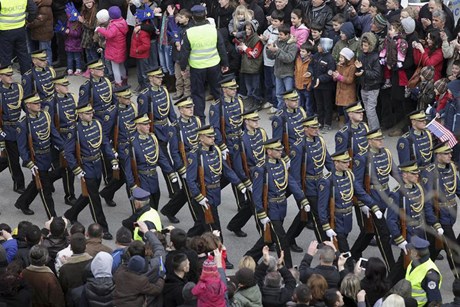Time of Change
February 17th marked the five-year anniversary of Kosovo’s independence, a timely celebration given recent successes in its dealings with Serbia. NATO established the Kosovo Security Force (KSF) which symbolically marched through the capital painted with the flags of the 98 countries that recognize Kosovo to commemorate the occasion. The KSF was established as lightly armed security force to replace the Kosovo Protection Corps, a group seen as largely consisting of veterans of the Serbian independence campaign. In addition to the KSF, NATO Secretary General Anders Fogh Rasmussen highlighted many of the great strides made in Kosovo in the past year in his 2012 Annual Report. As he explains, efforts in conjunction with the EU allowed Kosovo to end its supervised independence on September 10th, 2012. Improvements in the security situation allowed the Supreme Allied Commander Europe (SACEUR) to pull out reserve forces by the end of this past year. National, cultural and religious sites monitored by NATO forces are also increasingly being relinquished to the local authorities. These improvements in the security situation have been part of the trend of recent success towards normalizing Serbia-Kosovo relations.
The EU has made it clear that Serbia, regardless of Kosovo recognition, must establish functional relations with Kosovo and relinquish its grip on the Serb-dominated North in order to join. More then ever, Serbian politicians seem to agree over the paramount importance of doing what is necessary to avoid falling further behind neighboring Croatia, which will officially become an EU member in July. This past October, Kosovar Prime Minister Hashim Thaci and Serbia’s Ivica Dacic met in Brussels for the first symbolic political contact between the two governments since independence was declared in 2008. After another meeting on December 4th, progress was made to include regulation of border crossings. Many hope the pressure of the looming EU accession talks in June for Serbia will even further motivate prospects for greater improvement of relations and stability.
Among the already mentioned developments, Wednesday, February 6th saw both heads of state symbolically meet for the first time since Kosovo’s independence. In an interview prior to the meeting, Kosovo President Jahjaga highlighted how these talks aimed to further foster good neighborly relations towards ensuring peace and stability in the region. Despite the symbolism of the event, Serbia’s position with respect to Kosovo’s independence remains unchanged. At the meeting Serbian President Nikolic warned the President that, “the dialogue will not move toward a solution if she continues to insist that Kosovo is independent.”
Powerful Pragmatism
Although no Serbian government appears willing to acknowledge Kosovo’s declaration of independence, EU membership aspirations have acted as an effective carrot and stick for the Serbian government. The first month of 2013 demonstrated a renewed vigor on the part of the Serbian government to ensure EU accession talks scheduled for June go ahead as planned. In January, Serbian Prime Minister Ivica Dacic told officials that Serbian sovereignty over Kosovo was “practically non-existent,” and stressed that Belgrade could no longer, “keep its head in the sand.” Such a claim tacitly demonstrated a Serbian position to resolve the Kosovo problem rooted in coexistence. Other officials are demonstrating similar reconciliatory attitudes. Aleksander Vucic, Serbian Minister of Defence and former anti-Western nationalist has admitted the importance of EU admission and that, “the date (for EU talks) is what we must all focus and concentrate on, to finish that important job, and then we’ll see the light at the end of the tunnel.”[captionpix align=”right” theme=”elegant” width=”320″ imgsrc=”http://gazeta-shqip.com/lajme/wp-content/uploads/2013/02/newborn-opk-620×243.jpg” captiontext=”To mark the 5-year Anniversary the New Born Obelisk, symbolic of Kosovo’s Independence, was painted with flags of the recognizing countries.”]
Reflecting these opinions, Serbian lawmakers adopted a resolution on January 13th that seemingly offered to recognize Pristina’s authority over Kosovo by granting greater autonomy to the Serb minority, particularly in the North. In addition, Serbia and Kosovo agreed to EU-mediated talks with national representatives, to further resolve relations between the two neighbors. EU foreign policy chief Catherine Ashton will mediate talks between the two envoys, playing a determinant role in the proceeding of Serbian accession talks. Negotiations between Belgrade and Pristina focusing strictly on technical issues like telecoms and electricity have already allowed the two countries to reach various status neutral agreements.
Remaining Challenges
The crucial dilemma is over the status of the 40,000 Serbs adjoined to the Serbian border in the North of Kosovo who do not want to live in Kosovo. Currently, these Serb-majority municipalities have important elements of self-rule for dealing with social issues, health and education. They also have the right to funding from Belgrade. The intent of enshrining these in the Ahtisaari Plan was to appease the local Serbians, allowing institutions to exist with links to Serbia while remaining in Kosovo. On January 30th, officials from Kosovo’s four Serbian majority municipalities organized a protest against the apparent rapprochement underway. Banners carried by protesters included accusations that, “only traitors would give up on Kosovo,” and that the Constitution and UN Resolution 1244 be respected. The protest adopted a declaration rejecting all agreements reached and a halt to additional agreements. It will be important for Belgrade to ensure these Northern Serbs that they will not be cut-off from Serbia and that Belgrade is attempting to pursue the best and most viable option for all involved parties.
For many Albanian Kosovars, granting further concessions is also unwanted. Early February saw two incidents demonstrating that resolutions over the North Kosovo problem remain precarious. On Sunday February 3rd, two explosions allegedly targeted Serbs employed by the Kosovo authorities. The next day shrapnel wounded two Serbian children after a hand grenade was thrown into their home. In the past, Albanian Kosovars seeking Western support and hoping to negate compromise used threats of violence and irredentist instability. The absence of escalation in the aftermath of these incidents has shown that traditional zero-sum warnings of instability may be decreasingly applicable. The Serbian government’s tabled resolution suggesting the North be given an increased degree of autonomy within Kosovo is increasingly becoming the most pragmatic and suitable option.
Top down meetings and action, backed by EU officials is only part of the much longer normalization process underway on the ground. It is important that the EU take heed of these recent episodes as they are demonstrative of the limitations on recent diplomatic gains. The Serbian government has avoided exacerbating disputed issues, like the statehood question, by circumventing it altogether, searching instead for common ground of practical problems and mutual interests. Buttressed by this increasingly entrenched dialogue and with hopes of EU accession in the future, achieving an acceptable form of Northern autonomy is more realistic now then ever.




